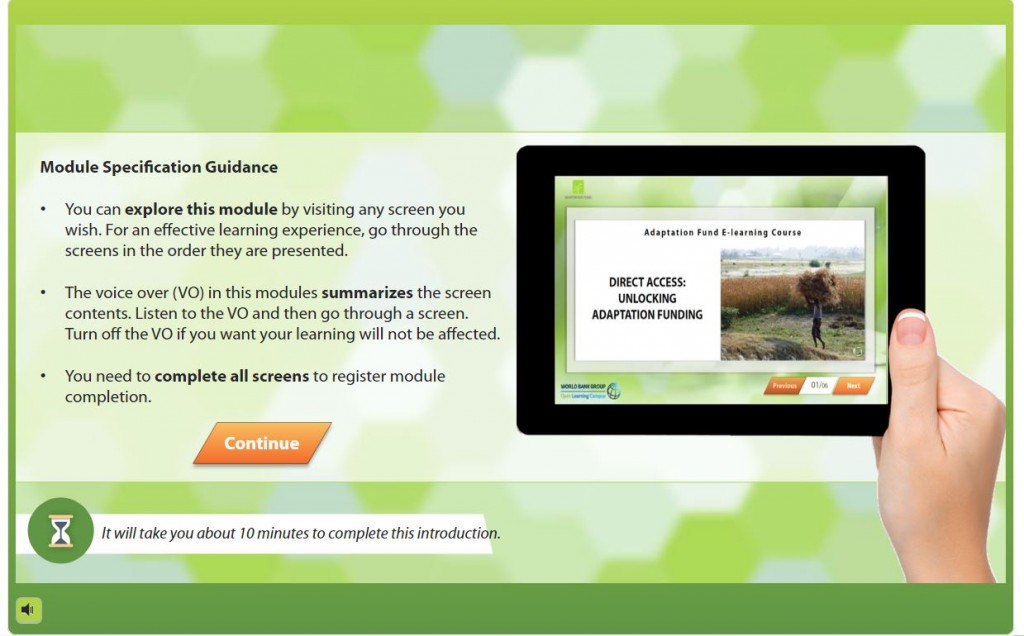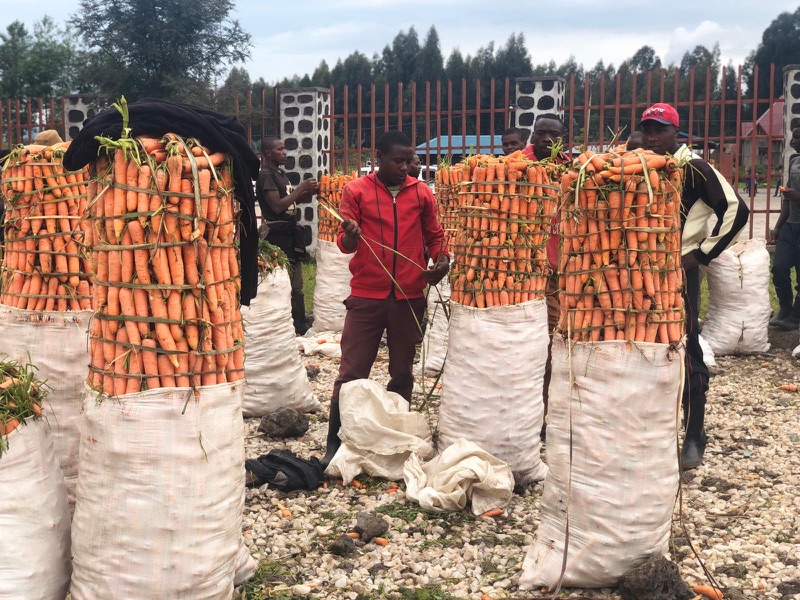Carrot washing station in Mukamira, Rwanda with youth engagement in AF-funded project there. (Photo by AF)
Adaptation Fund’s New E-Learning Course on Direct Access Designed to Help Countries and Stakeholders Unlock Climate Finance
Washington, D.C. (November 27, 2019) — The Adaptation Fund has enhanced its suite of knowledge products with the launch of an interactive new learning tool aimed at helping developing country organizations improve access to adaptation finance.
The Fund’s new E-Learning Course on Direct Access provides an overview and guide of the Fund’s accreditation process of becoming an implementing entity with the Fund, and also covers its project design and implementation processes to help implementers develop effective projects on the ground. It has a particular focus on imparting user-friendly knowledge of the Fund’s requirements for accreditation, and understanding and applying environmental, social and gender considerations when formulating and implementing sustainable climate change adaptation projects.
It is organized into two modules, and utilizes case studies to guide users through all of the key steps. It also contains quizzes to test the participant’s knowledge along the way. It is self-paced, but users generally can complete it in about three hours in one go, and will receive a certificate upon completion.
The new course is available online now, and will be officially launched during a side event to be held on Dec. 5 at 3 pm in Room 2 during the UN COP 25 climate conference in Madrid, Spain.
The course is largely designed to help prospective national implementing entities to achieve accreditation and develop projects under the Fund’s pioneering Direct Access modality — which empowers country ownership in adaptation. The course is aimed at helping implementing entities toward attaining accreditation, and to support them in developing high-quality proposals.
“The E-Learning Course is an important knowledge tool for capacity building at the national and subnational level as it tackles the specific challenges and opportunities associated with the Direct Access modality and in particular the capacity gaps in financial management and fiduciary standards, environmental, social and gender standards and its mitigation factors,” said Ms. Cristina Dengel, Knowledge Management Officer of the Adaptation Fund. “The course is a highly interactive tool, featuring various learning methods, including case studies and quizzes along all lessons testing the participant’s knowledge. It also includes additional resources and guidance documents and is self-paced and thus allows users to take it at their convenience.”
The E-Learning Course, which was produced by the Adaptation Fund with the Open Learning Campus (OLC) of the World Bank Group and is hosted by the OLC, is free and open to anyone interested in taking it. It is targeted especially at the Fund’s Designated Authorities within developing country governments, as well as accredited national implementing entities (NIEs) making use of Direct Access, prospective NIEs, other Fund partners, and the private sector.
The knowledge tool further supports the Fund’s emerging ‘Learning and Sharing’ pillar of its five-year Medium-Term Strategy launched last year, which is designed to enhance quality adaptation actions, innovative practices and learning across the adaptation field to further support the objectives of the Paris Agreement and UN Sustainable Development Goals.
 “This is a great example of the Adaptation Fund putting its lessons and experiences into action through important learning tools to multiply the effects of its work,” said Mr. Mikko Ollikainen, Manager of the Adaptation Fund. “The Fund is in a unique position having built up 12 years of climate resilience, building knowledge through its concrete adaptation work on the ground and building country capacities through Direct Access. It is continuing to create valuable knowledge and models that can enhance adaptation practices across the field that can contribute to addressing the urgency of climate change. We see it as our duty to make these lessons learned available to all stakeholders, to help them more efficiently and effectively design and implement adaptation action.”
“This is a great example of the Adaptation Fund putting its lessons and experiences into action through important learning tools to multiply the effects of its work,” said Mr. Mikko Ollikainen, Manager of the Adaptation Fund. “The Fund is in a unique position having built up 12 years of climate resilience, building knowledge through its concrete adaptation work on the ground and building country capacities through Direct Access. It is continuing to create valuable knowledge and models that can enhance adaptation practices across the field that can contribute to addressing the urgency of climate change. We see it as our duty to make these lessons learned available to all stakeholders, to help them more efficiently and effectively design and implement adaptation action.”
The Fund also recently released other knowledge tools, such as a report on ‘Bridging the Gaps in Accreditation and Reaccreditation’, and a brochure on lessons from a recent Country Exchange on adaptation in Chile that further complement the case studies in the E-Learning Course. “The accreditation report contains many cases examples across the spectrum of different types of national and regional implementing entities and accreditation processes, and is designed to help entities reduce the time it takes to become accredited or reaccredited with the Fund,” said Ms. Silvia Mancini, Accreditation Officer of the Adaptation Fund.
The Dec. 5 side event at COP 25, Bridging the gaps between climate finance access and building resilience on the ground – Climate Finance Access and project development, during which the Fund will officially launch and demonstrate the E-Learning Course, will feature speeches from Adaptation Fund leadership, the Board Chair and representatives from the Fund’s national implementing entities in Chile, Costa Rica and Senegal who will speak about the importance of such new knowledge tools in accessing climate finance and putting it into effective action. Please view a list of the Fund’s activities at COP 25 here.
ABOUT the ADAPTATION FUND
Since 2010, the Adaptation Fund has committed about US$ 720 million for climate change adaptation and resilience projects and programmes, including 100 concrete localized adaptation projects in the most vulnerable communities of developing countries around the world with more than 6 million direct beneficiaries. It also pioneered Direct Access, empowering countries to access funding and develop projects directly through accredited national implementing entities.
Communications: Matthew Pueschel, mpueschel@adaptation-fund.org or +1-202-473-6743
Attachments
| Attachment | Type | Size |
|---|---|---|
| Press Release, November 27, 2019 | 176 KB |



